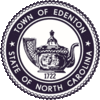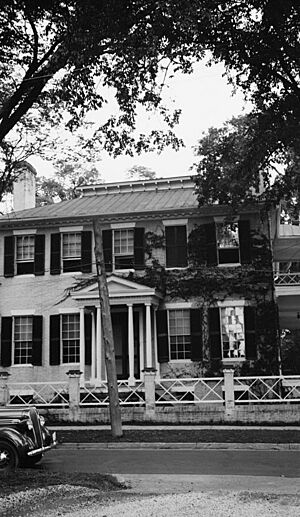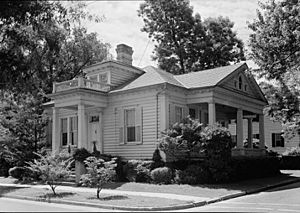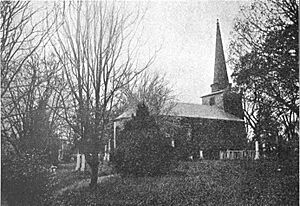Edenton, North Carolina facts for kids
Quick facts for kids
Edenton, North Carolina
|
|||
|---|---|---|---|
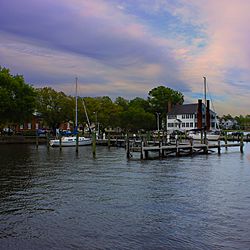
Downtown Edenton Waterfront
|
|||
|
|||

Location of Edenton, North Carolina
|
|||
| Country | United States | ||
| State | North Carolina | ||
| County | Chowan | ||
| Incorporated | 1722 | ||
| Named for | Charles Eden | ||
| Area | |||
| • Total | 5.57 sq mi (14.43 km2) | ||
| • Land | 5.38 sq mi (13.92 km2) | ||
| • Water | 0.20 sq mi (0.51 km2) | ||
| Elevation | 13 ft (4 m) | ||
| Population
(2020)
|
|||
| • Total | 4,460 | ||
| • Density | 829.77/sq mi (320.40/km2) | ||
| Time zone | UTC-5 (Eastern (EST)) | ||
| • Summer (DST) | UTC-4 (EDT) | ||
| ZIP code |
27932
|
||
| Area code(s) | 252 | ||
| FIPS code | 37-20120 | ||
| GNIS feature ID | 2406422 | ||
Edenton is a historic town in North Carolina, United States. It is the main town of Chowan County and is located right on the Albemarle Sound. In 2020, about 4,397 people lived there. Edenton is part of North Carolina's Inner Banks region.
This town has become a popular place for people to retire. It is also a great spot for "heritage tourism," which means people visit to learn about its rich history.
Edenton was once the second official capital of North Carolina during the colonial times. It served as the capital from 1722 to 1743. The town is famous for the Edenton Tea Party in 1774. This was a protest organized by women who supported the Boston Tea Party. Edenton is also the birthplace of Harriet Jacobs, an African American writer. Her 1861 book, Incidents in the Life of a Slave Girl, is an important American story. Today, tourism and being a retirement spot are the main drivers of Edenton's economy.
Contents
History of Edenton
Early Settlement
In 1658, explorers from Jamestown traveled through the wild lands. They found a good spot on the northern shore of a small natural harbor. This area is now called Edenton Bay. This was the first lasting European settlement in what is now North Carolina.
The town was first called "the Towne on Queen Anne's Creek" in 1712. Later, it had other names like "Ye Towne on Mattercommack Creek" and "the Port of Roanoke." In 1722, it was officially named "Edenton" to honor Governor Charles Eden, who had passed away that year.
Edenton as a Capital
Edenton became the second capital of the Province of North Carolina from 1722 to 1743. The governor lived there, and the town grew during this time.
Important Events for Women's Rights
A very important event for women's history happened in Edenton in 1774. Fifty-one women, led by Penelope Barker, signed a petition. They agreed to stop buying English tea and other products. This protest became known as the Edenton Tea Party. It was the first known political action by women in the American colonies. People in London were so surprised that newspapers even published drawings making fun of the women. Penelope Barker's home, the Barker House, is now a museum that you can visit for free.
Key Figures in American History
Joseph Hewes, who lived in Edenton, was a successful merchant. He was chosen as the first Secretary of the Navy in 1776. John Adams said that Hewes "laid the foundation... of the American Navy." Hewes also signed the United States Declaration of Independence.
James Iredell, another person from Edenton, was the youngest member of the first United States Supreme Court at age 38. He was chosen by George Washington. His son, James Iredell Jr., later became a governor of North Carolina and a U.S. Senator. You can visit his home through the Historic Edenton Visitors Center.
James Wilson, who signed both the Declaration of Independence and the United States Constitution, passed away in Edenton in 1798. He was 55 years old and was traveling for his work as a judge.
Harriet Jacobs' Story
Harriet Jacobs was born in Edenton in 1813. Her brother, John, was born in 1815. They were both born into a system where people were treated as property. Harriet and her children were baptized at St. Paul's. Harriet's early life was near Horniblow's tavern, a hotel in town.
Later, Harriet and John were forced to work for a doctor named James Norcom. In 1835, Harriet hid in a small space in her grandmother's house. She stayed hidden for seven years before she could finally escape to New York. There, she wrote her famous book, Incidents in the Life of a Slave Girl. This book is now considered an "American classic."
Civil War and Economic Growth
During the Civil War in 1862, a group of soldiers called the Albemarle Artillery was formed in Edenton. Their cannons were made from bronze bells taken from local churches and the courthouse. These cannons were known as the Edenton Bell Battery. Two of these cannons, the St. Paul and Edenton, are now back in Edenton and can be seen at the waterfront park.
Edenton's economy started to grow again around 1890. This was thanks to the lumbering industry, a cotton mill built in 1898, and a peanut-processing plant opened in 1909.
Historic Buildings and Landmarks
Edenton is home to the 1886 Roanoke River Lighthouse. This lighthouse has a special "screw-pile" design. Its supports were literally screwed into the riverbed to keep it steady during storms. The Roanoke River Lighthouse is thought to be the last example of a rectangular building built on a screw-pile base in the U.S. It was used from 1887 until 1941.
The town has many old houses and public buildings. The Cupola House, built in 1758, is a National Historic Landmark. The Chowan County Courthouse, built in 1767, is also a National Historic Landmark and is still used today. The Lane House, built in 1719, is believed to be the oldest house still standing in North Carolina.
Geography of Edenton
Edenton is located in the southern part of Chowan County. It sits at the northern end of Edenton Bay. This bay is just north of where the Chowan and Roanoke rivers meet to form Albemarle Sound.
U.S. Route 17 is a major highway that runs along the northern edge of the town. You can get to Edenton from five exits on this highway. US 17 goes northeast about 27 miles to Elizabeth City. It goes southwest about 37 miles to Williamston. Nags Head on the Outer Banks is about 72 miles to the east by road. Raleigh, the state capital, is about 136 miles to the west.
The United States Census Bureau says that Edenton covers about 5.57 square miles in total. Most of this area, about 5.38 square miles, is land. The rest, about 0.20 square miles, is water.
Climate in Edenton
| Climate data for Edenton, North Carolina (1991–2020 normals, extremes 1896–present) | |||||||||||||
|---|---|---|---|---|---|---|---|---|---|---|---|---|---|
| Month | Jan | Feb | Mar | Apr | May | Jun | Jul | Aug | Sep | Oct | Nov | Dec | Year |
| Record high °F (°C) | 80 (27) |
83 (28) |
90 (32) |
95 (35) |
98 (37) |
102 (39) |
105 (41) |
104 (40) |
99 (37) |
95 (35) |
88 (31) |
87 (31) |
105 (41) |
| Mean maximum °F (°C) | 70.1 (21.2) |
72.7 (22.6) |
80.3 (26.8) |
85.3 (29.6) |
90.3 (32.4) |
94.2 (34.6) |
95.9 (35.5) |
93.8 (34.3) |
90.1 (32.3) |
84.0 (28.9) |
77.1 (25.1) |
70.7 (21.5) |
96.9 (36.1) |
| Mean daily maximum °F (°C) | 52.4 (11.3) |
56.0 (13.3) |
63.0 (17.2) |
72.2 (22.3) |
79.3 (26.3) |
86.1 (30.1) |
89.0 (31.7) |
86.8 (30.4) |
81.5 (27.5) |
72.6 (22.6) |
62.9 (17.2) |
55.3 (12.9) |
71.4 (21.9) |
| Daily mean °F (°C) | 43.4 (6.3) |
45.9 (7.7) |
52.3 (11.3) |
61.4 (16.3) |
69.4 (20.8) |
77.0 (25.0) |
80.5 (26.9) |
78.7 (25.9) |
73.3 (22.9) |
63.4 (17.4) |
53.4 (11.9) |
46.5 (8.1) |
62.1 (16.7) |
| Mean daily minimum °F (°C) | 34.4 (1.3) |
35.8 (2.1) |
41.5 (5.3) |
50.6 (10.3) |
59.4 (15.2) |
67.9 (19.9) |
72.0 (22.2) |
70.6 (21.4) |
65.1 (18.4) |
54.1 (12.3) |
44.0 (6.7) |
37.8 (3.2) |
52.8 (11.6) |
| Mean minimum °F (°C) | 16.1 (−8.8) |
20.3 (−6.5) |
25.5 (−3.6) |
33.7 (0.9) |
44.2 (6.8) |
54.1 (12.3) |
61.9 (16.6) |
60.2 (15.7) |
51.6 (10.9) |
37.6 (3.1) |
27.9 (−2.3) |
22.8 (−5.1) |
14.4 (−9.8) |
| Record low °F (°C) | −4 (−20) |
0 (−18) |
15 (−9) |
21 (−6) |
35 (2) |
45 (7) |
47 (8) |
46 (8) |
38 (3) |
24 (−4) |
16 (−9) |
5 (−15) |
−4 (−20) |
| Average precipitation inches (mm) | 3.50 (89) |
3.24 (82) |
4.03 (102) |
3.27 (83) |
3.72 (94) |
4.92 (125) |
6.04 (153) |
6.16 (156) |
5.62 (143) |
3.75 (95) |
3.24 (82) |
3.49 (89) |
50.98 (1,295) |
| Average snowfall inches (cm) | 0.9 (2.3) |
0.6 (1.5) |
0.0 (0.0) |
0.0 (0.0) |
0.0 (0.0) |
0.0 (0.0) |
0.0 (0.0) |
0.0 (0.0) |
0.0 (0.0) |
0.0 (0.0) |
0.0 (0.0) |
0.8 (2.0) |
2.3 (5.8) |
| Average precipitation days (≥ 0.01 in) | 8.8 | 8.2 | 8.7 | 8.1 | 8.8 | 8.2 | 10.1 | 9.3 | 8.0 | 6.3 | 7.0 | 7.8 | 99.3 |
| Average snowy days (≥ 0.1 in) | 0.4 | 0.4 | 0.0 | 0.0 | 0.0 | 0.0 | 0.0 | 0.0 | 0.0 | 0.0 | 0.0 | 0.2 | 1.0 |
| Source: NOAA | |||||||||||||
People in Edenton
| Historical population | |||
|---|---|---|---|
| Census | Pop. | %± | |
| 1790 | 1,575 | — | |
| 1850 | 1,607 | — | |
| 1860 | 1,504 | −6.4% | |
| 1870 | 1,243 | −17.4% | |
| 1880 | 1,382 | 11.2% | |
| 1890 | 2,205 | 59.6% | |
| 1900 | 3,046 | 38.1% | |
| 1910 | 2,789 | −8.4% | |
| 1920 | 2,777 | −0.4% | |
| 1930 | 3,563 | 28.3% | |
| 1940 | 3,835 | 7.6% | |
| 1950 | 4,468 | 16.5% | |
| 1960 | 4,458 | −0.2% | |
| 1970 | 4,956 | 11.2% | |
| 1980 | 5,357 | 8.1% | |
| 1990 | 5,268 | −1.7% | |
| 2000 | 5,394 | 2.4% | |
| 2010 | 5,004 | −7.2% | |
| 2020 | 4,397 | −12.1% | |
| 2021 (est.) | 4,391 | −12.3% | |
| U.S. Decennial Census | |||
2020 Census Information
| Race | Number | Percentage |
|---|---|---|
| White (non-Hispanic) | 1,771 | 39.71% |
| Black or African American (non-Hispanic) | 2,335 | 52.35% |
| Native American | 15 | 0.34% |
| Asian | 23 | 0.52% |
| Pacific Islander | 1 | 0.02% |
| Other/Mixed | 126 | 2.83% |
| Hispanic or Latino | 189 | 4.24% |
In 2020, there were 4,460 people living in Edenton. There were 2,084 households and 1,177 families.
Culture and Attractions
Edenton is a special town in northeastern North Carolina. It is known for its beautiful old buildings from the 1700s, 1800s, and early 1900s. These buildings tell stories about the people who lived and worked there. The Lane House, built in 1719, might be the oldest house in North Carolina. Edenton played a big part in the early history of the colonies, the state, and the country.
The Cupola House, built in 1758, is a registered National Historic Landmark. It stands by the waterfront. The Chowan County Courthouse, built in 1767, is another National Historic Landmark and is still used for court events today. The Barker House was the home of Penelope Barker. She organized the first political action by women in the colonies. Her home is now a museum that teaches about colonial history. You can also visit the home of James Iredell Sr. through the Historic Edenton Visitors Center.
Churches in Edenton
Edenton has many places of worship. Some of the churches in the community include:
- St Annes Catholic Church (built around 1821)
- First Presbyterian Church of Edenton (built around 1946)
- Edenton United Methodist Church
- Open Door Church
- St. Paul's Episcopal Church (built around 1736)
- Edenton Baptist Church
- Macedonia Baptist Church
- Kadesh African Methodist Episcopal Zion Church
Sports in Edenton
For two years, in 1951 and 1952, Edenton had a professional minor league baseball team. They played at Historic Hicks Field. Since 1998, Hicks Field has been the home field for the Edenton Steamers. This is a college summer baseball team that plays in the Coastal Plain League.
Famous People from Edenton
Many notable people have connections to Edenton:
- William Allen (1803–1879) – Born in Edenton, he later became the governor of Ohio.
- Penelope Barker (1728–1796) – She organized the first political action by women in the American colonies.
- Robert Brown (born 1960) – A former NFL defensive end for the Green Bay Packers.
- Wes Chesson (born 1949) – A former NFL wide receiver for the Atlanta Falcons and Philadelphia Eagles.
- Golden Frinks (1920–2004) – A civil rights leader who worked for the SCLC.
- Jesse González (born 1995) – An MLS goalkeeper for the FC Dallas.
- Joseph Hewes (1730–1779) – He signed the United States Declaration of Independence and was the first Secretary of the U.S. Navy.
- James Iredell (1751–1799) – He was an Associate Justice of the U.S. Supreme Court.
- Harriet Jacobs (1813–1897) – An abolitionist and author of Incidents in the Life of a Slave Girl.
- John Swanson Jacobs (1815–1873) – Harriet's brother, also an abolitionist speaker and writer.
- Josephine Leary (1856–1923) – A real estate business owner who was born into a system where people were treated as property.
- Samuel Johnston (1733–1816) – A leader during the American Revolution and the first U.S. senator from North Carolina.
- Zack Valentine (born 1957) – A Super Bowl-winning Pittsburgh Steelers linebacker.
- Hugh Williamson (1735–1819) – He signed the United States Constitution.
- Big Daddy Wilson (born 1960) – A singer and songwriter known for electric and soul blues music.
- Adrian H. Wood – An educator and writer.
Images for kids
See also
 In Spanish: Edenton (Carolina del Norte) para niños
In Spanish: Edenton (Carolina del Norte) para niños
 | John T. Biggers |
 | Thomas Blackshear |
 | Mark Bradford |
 | Beverly Buchanan |



